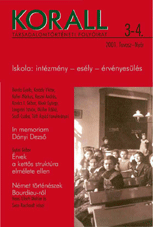Az oktatás társadalomtörténeti megközelítése: négy dunántúli nemesifjú kiművelése a reformkorban
The social historical approach of education: the education of four young noblemen in the reform era
Author(s): Csaba SasfiSubject(s): History
Published by: KORALL Társadalomtörténeti Egyesület
Keywords: social history; social history of education; 18th–19th centuries; education of noble men; Hungary; memoirs
Summary/Abstract: This paper applies the method of investigating the demand and supply characteristics in the social historical analysis of 19th century secondary education in Hungary, emphasizing the demand instead of the supply for education. It would like to clarify the impact of cultural, structural and individual factors on the increasing need for higher education and on the chance of schooling in a period, when inequality in the chances of schooling was a normal phenomenon. Therefore, analysis of personal sources, investigation of memoirs on schooling and career of four noblemen stand in the focus of this study. The subjective evaluations in these personal writings are compared with the contemporary normative texts on the regulation of education. The second part of the paper highlights the role of higher education in the system of values of the different groups of nobility, which were uniformly privileged but were culturally and financially divergent in the late estate society of Hungary. On the basis of the above mentioned analysis we can conclude that higher education was a norm for the elite layer of nobility on the one hand, and it was a model to follow for people of lower nobility regarding social mobility.
Journal: Korall - Társadalomtörténeti folyóirat
- Issue Year: 2001
- Issue No: 3-4
- Page Range: 20-52
- Page Count: 33
- Language: Hungarian

